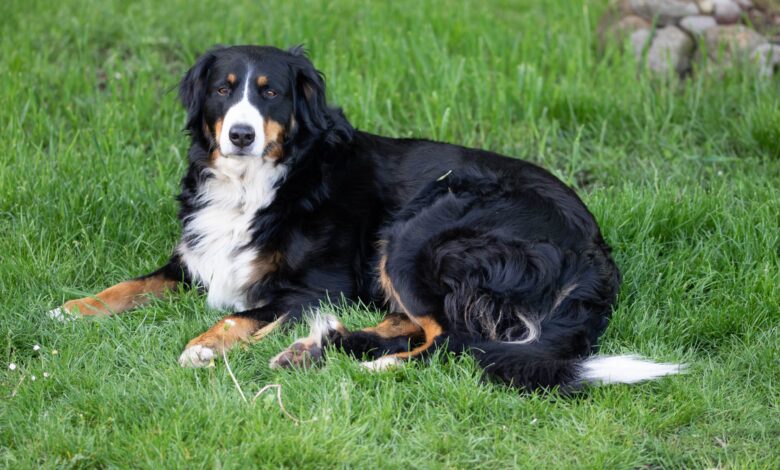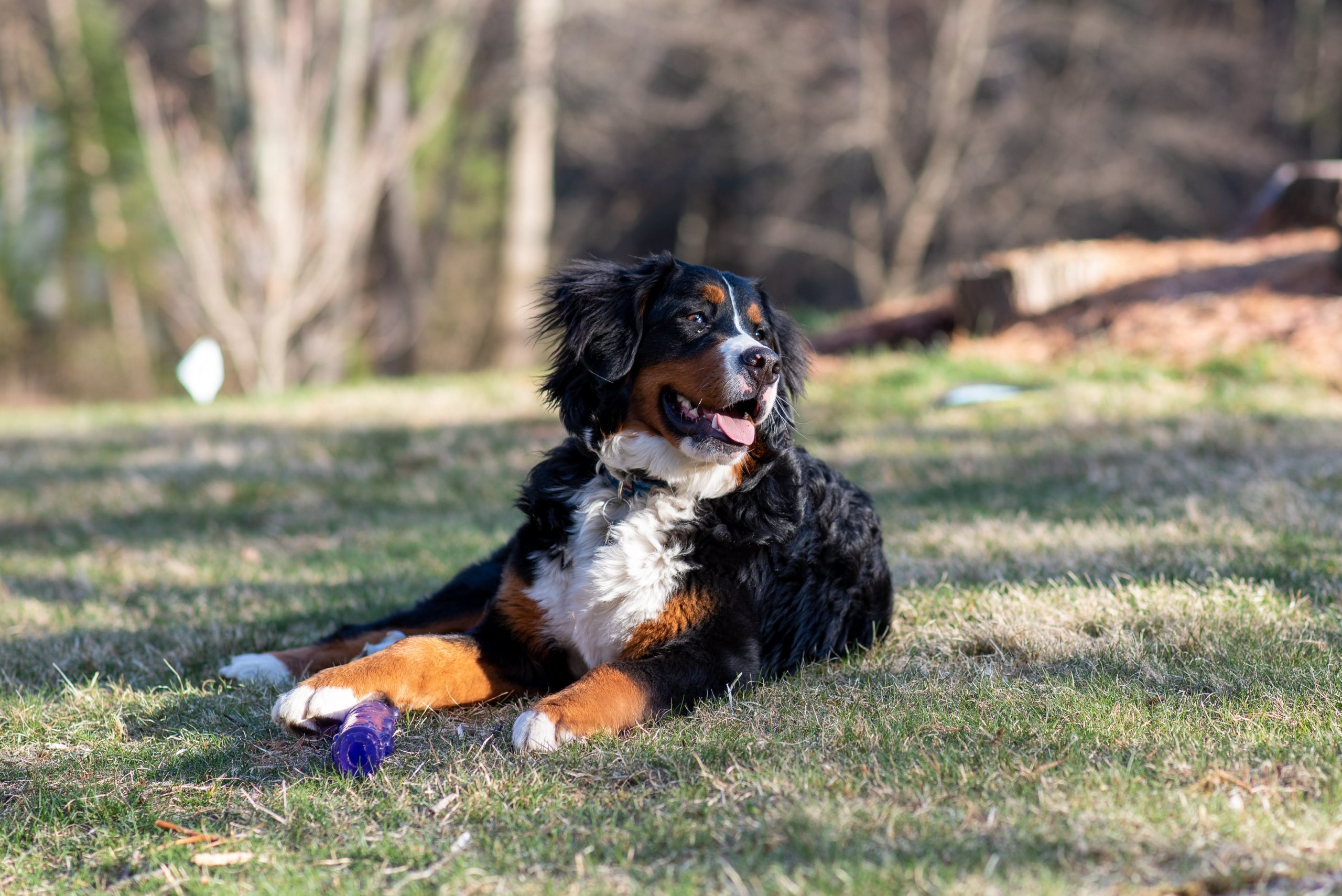How Much Do You Feed a Bernese Mountain Dog

Feeding a Bernese Mountain Dog the right amount of food is critical to ensure they remain healthy and avoid issues such as obesity, which they are prone to. The large size of the breed combined with their relatively sedentary nature (compared to their working ancestors) means calorie control is as important as the volume of food. We’ll explore how to balance these factors to feed your Bernese Mountain Dog adequately.
1. Assessing Your Bernese Mountain Dog’s Nutritional Needs
Bernese Mountain Dogs can weigh anywhere from 70 to 115 pounds, with males being larger on average. Their food requirements will differ significantly from smaller breeds due to their size and also because of their slower metabolism.
2. Understanding the Caloric Needs of Your Bernese Mountain Dog
An adult Bernese Mountain Dog typically requires between 1,400 to 2,000 calories per day, but this will vary depending on their activity level and life stage. Puppies and young adults, for instance, may require more calories to support their growth and higher energy levels.
3. Calculating the Right Food Portions
Most high-quality dog foods provide feeding guides on their packaging that can help you determine a starting point for portion sizes. For Bernese Mountain Dogs, this usually translates to about 3 to 6 cups of kibble per day, which should be adjusted to maintain a healthy weight.
4. The Importance of Meal Frequency
Bernese Mountain Dogs often do best with two meals per day. This not only supports their energy needs throughout the day but also reduces the risk of bloating, a serious health risk for large breeds.
5. Adjusting Diet with Age
As Bernese Mountain Dogs age, their metabolism slows down, which may require a decrease in daily calorie intake. Senior dogs also may have different nutritional needs, so it’s important to choose a diet that’s formulated for older dogs and monitor their weight closely.
6. Treats and Extras: How Much Is Too Much?
Treats should be given sparingly to Bernese Mountain Dogs, as they can quickly lead to weight gain. Keep treats to less than 10% of their daily caloric intake and opt for healthy options like carrots or apples.
7. Monthly Feeding Cost Estimates
The monthly cost of feeding a Bernese Mountain Dog can range from $40 to $100 or more, depending on the quality of food you choose. Special diets, like grain-free or raw food, may cost more than traditional kibble.
Conclusion
Feeding a Bernese Mountain Dog requires careful attention to their dietary needs to ensure they stay healthy and active throughout their lives. Regular check-ups with a vet, careful monitoring of their weight, and adjustments to their diet as they age are all important aspects of their care. By following these guidelines, you can provide your Bernese Mountain Dog with a diet that supports a long and happy life.
Frequently Asked Questions About Feeding a Bernese Mountain Dog
1. How much should I feed my adult Bernese Mountain Dog daily?
An adult Bernese Mountain Dog typically requires about 3 to 6 cups of high-quality dog food per day, divided into two meals. This range can vary based on the dog’s activity level, age, and the food’s caloric content. It’s essential to monitor their weight and adjust food portions accordingly to maintain a healthy condition.
2. What are the calorie requirements for a Bernese Mountain Dog?
The calorie requirements for an adult Bernese Mountain Dog range from 1,400 to 2,000 calories per day, depending on their size and activity level. Active dogs or those in colder climates may need more calories, while less active dogs or those prone to weight gain may need fewer.
3. Can Bernese Mountain Dogs have a grain-free diet?
Bernese Mountain Dogs can have a grain-free diet if it meets their nutritional needs and they are not allergic to grains. However, it’s important to ensure that the diet is complete and balanced. Consult with a veterinarian to decide if a grain-free diet is appropriate for your dog.
4. How often should I feed my Bernese Mountain Dog puppy?
Bernese Mountain Dog puppies should be fed three to four times a day with a high-quality puppy formula to support their growth. As they transition into adulthood, around 12 to 18 months, you can reduce feeding to twice a day.
5. What is the best dog food for a Bernese Mountain Dog?
The best dog food for a Bernese Mountain Dog is one that is high in protein and fat to match their energy needs and formulated for large breeds. It should contain whole meat sources, healthy grains or vegetables, and be free from artificial additives.
6. How do I know if I’m feeding my Bernese Mountain Dog the right amount?
You’ll know you’re feeding your Bernese Mountain Dog the right amount if they maintain a healthy weight—no ribs prominently visible but easily felt under a thin layer of fat, and a visible waist when viewed from above. Regular vet check-ups and body condition assessments can help ensure you’re on track.
7. What human foods are safe for Bernese Mountain Dogs?
Safe human foods for Bernese Mountain Dogs include plain cooked meats, rice, certain vegetables like carrots and green beans, and fruits such as apples without the seeds. Always introduce new foods gradually and in moderation, and avoid toxic foods like chocolate, grapes, and onions.
8. How much will it cost to feed my Bernese Mountain Dog each month?
The monthly cost to feed a Bernese Mountain Dog can vary widely, generally between $40 to $100, depending on the type of food (kibble, wet food, raw diet) and the quality of the ingredients. Specialized or prescription diets may increase the cost.
9. How should I change my Bernese Mountain Dog’s diet as they age?
As Bernese Mountain Dogs age, their energy requirements decrease, so you may need to reduce their caloric intake to prevent obesity. Senior dogs also benefit from diets with higher-quality protein and joint-supporting supplements like glucosamine and chondroitin.
10. Are there any specific feeding considerations for Bernese Mountain Dogs?
Due to the risk of bloat in large breeds like the Bernese Mountain Dog, it’s advisable to feed them smaller portions more frequently and avoid vigorous exercise around meal times. Also, be mindful of their potential for food allergies and choose a hypoallergenic diet if needed.





